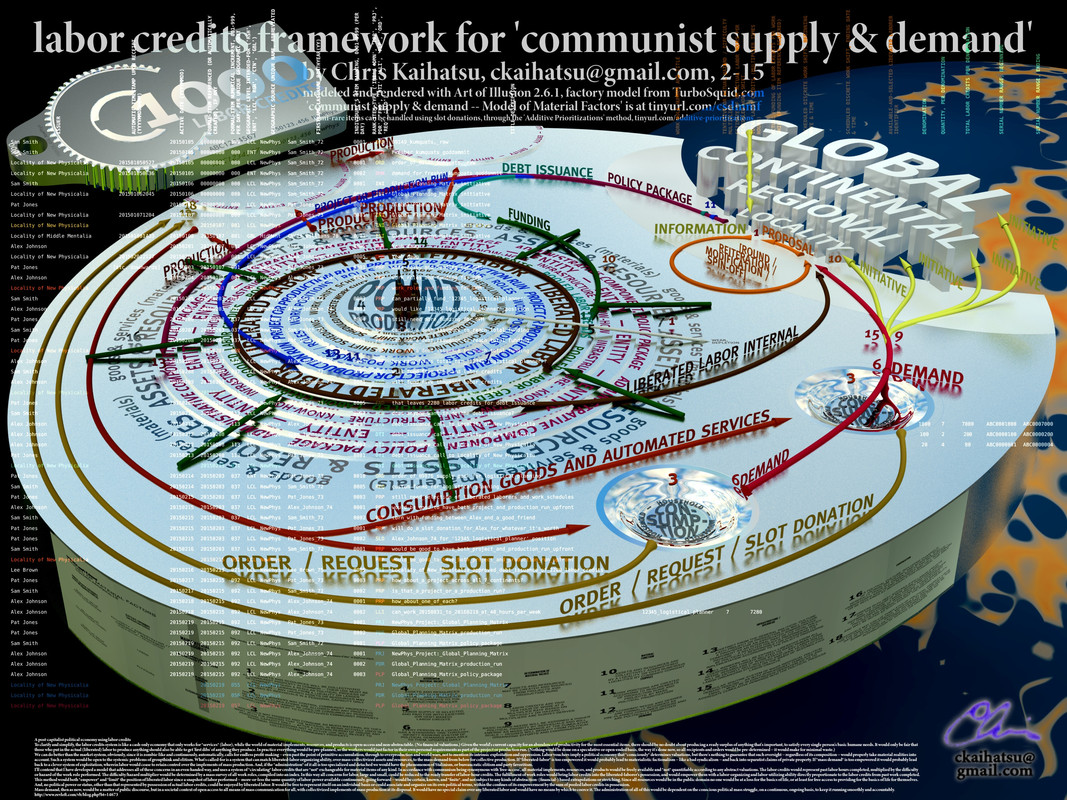late wrote:
Hardly, we've gone over this before explicitly.
Law creates value, it is part of the foundation of the Modern World. You are not going to invest large amounts of money or effort if someone can just take it.
Yes, I know the history of capitalism.
late wrote:
I know you think you can replace it magically, but that's a non-starter.
What the hell *is* this -- you keep imputing some kind of fantasy-land onto my politics, as though it's half-baked or not fully worked-out.
I have a fully consistent *model* available, for anyone's consideration, which also serves as a solid statement of what my politics *are*. No assumptions or imputations needed on your part.
late wrote:
Even with more modest ideas, actually replacing the status quo is close to impossible.
C'mon, late -- people said that about *slavery*, and you're an antifascist yourself.
late wrote:
One of those ideas is making all companies majority owned by workers. Or having a maximum income, or...
But it would be nice to hear the corrupt squeal like stuck pigs. Guess I'll just have to settle for Trump squealing like a stuck pig.
Hey, *there's* some positivity from you, in the right direction.
I happen to be *critical* of Wolff's 'worker cooperatives', mostly because he's unable to address *how* the co-workers are to acquire such costly private infrastructure in the first place. Bake sales at the local church don't cut it.
That said, though, I do support workers collectivism on-the-ground, as long as it's not geographically *separatist*. The point should be top-down for the sake of overthrowing the bourgeoisie (working class class war), but bottom-up once the class division is overcome since workers are inherently on-the-ground and know their workplaces the best, of anyone.
Emergent Central Planning
---
A proletarian revolution would mean taking the world's material economy *off* of the market system -- but then, what should *replace* it? Once the paradigm of exchange-values is imploded, how would an egalitarian society properly value goods, resources, and materials, *and* various different liberated-labor efforts (work roles), without regressing back to the use of market exchanges and exchange values?
One major problem with the 'communal' approach, even if implemented worldwide, is that we can't just pretend that all work roles are the same -- the unstated assumption with the 'communal' approach is that as long as one is *contributing* to the material commons, one should be able to *partake* from that resulting complex social production, for one's own needs. This is *not* an entirely bad premise, actually, because one implication of it is that people should be consuming from social production according to their *needs*, and not according to what they've *contributed* to society, because that would mean rewards-for-labor, or the implicit *commodification* of labor based on what goods can be exchanged for it.
This may sound *strange* at first, but one could think of it as a new Enlightenment of social norms -- all social production should be for satisfying *human need*, and for no other reason. It's only with the relatively recent advent of *industrial* mass production techniques that humanity is able to realize far more output / productivity for labor inputs, and this dynamic is what modern communism is premised on, since surplus labor value is currently *seized* by private ownership for its own self-aggrandizement. Under communism all labor value, however measured, would benefit those who need to take and consume from it, regardless of their contributions to the creation of it.
https://web.archive.org/web/20201211050 ... ?p=2889338










 - By wat0n
- By wat0n